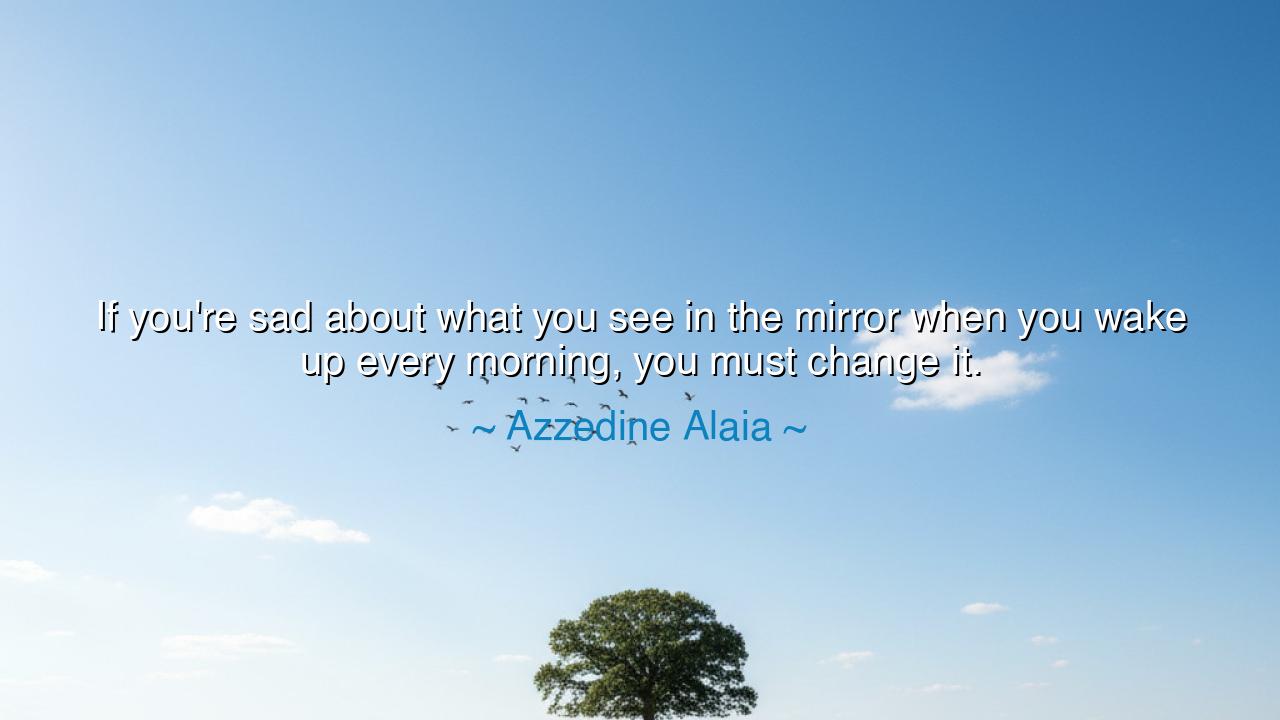
If you're sad about what you see in the mirror when you wake up
If you're sad about what you see in the mirror when you wake up every morning, you must change it.






Hear the words of Azzedine Alaia, master of craft and visionary of form: “If you’re sad about what you see in the mirror when you wake up every morning, you must change it.” At first these words seem simple, perhaps speaking only of fashion, of appearance, of what the eye beholds at dawn. Yet beneath them lies a timeless summons, ancient as the teachings of sages: that one must not live in sorrow at their own reflection. For the mirror does not only show the body—it shows the truth of the self.
The ancients, too, spoke of the mirror, though often without glass. To them it was the still water of a pond, or the gaze of another’s eyes, in which one beheld both beauty and flaw. The Oracle of Delphi commanded, “Know thyself.” In Alaia’s command, we hear an echo of this same wisdom: if in knowing yourself you feel despair, if the sight of your own being fills you with sadness, do not remain unmoved—rise and change. For it is folly to curse the reflection without transforming the one who is reflected.
History tells of countless souls who obeyed this law. Consider Saint Augustine, who looked into the mirror of his soul and saw corruption, weakness, and despair. He was sad, deeply so, at the man he had become. Yet he did not curse the glass; he chose to change. Through discipline, prayer, and reflection, he became one of the greatest voices of his age. The sadness that the mirror revealed was not his end but his beginning, the seed of transformation.
So too with Mahatma Gandhi. As a young man, he once stood ashamed of himself, beaten down by timidity and failure. He looked into the mirror and saw weakness. But rather than turn away, he chose to change—to embrace truth, courage, and service. From the sadness of his reflection arose the fire that moved nations. This is the lesson Alaia whispers: the mirror is not a prison—it is a teacher.
Yet let us not mistake his words. To change what we see is not only about garments, bodies, or surface—it is about essence. If you are weary, seek rest. If you are cruel, seek gentleness. If you are hollow, seek meaning. The mirror reflects not only the skin, but the story written in the eyes, the shadow or the light of the spirit. To look each dawn and feel despair is a summons to act—not to hide, not to curse fate, but to rise and remake yourself.
The sadness Alaia names is not a punishment, but a gift. For it is better to feel sorrow at your reflection and act, than to drift through life numb, never awakening to your true state. Sadness is the soul’s alarm, telling you that something must be renewed. To ignore it is to fall deeper into ruin; to heed it is to begin the path to greatness.
The lesson is clear: face your mirror each morning with courage. If what you see fills you with joy, give thanks and continue. If what you see fills you with sadness, do not turn away—ask what must be changed, and then take action. Begin small, but begin. Refuse to let sorrow be the last word. The mirror shows you truth; it is you who must decide what to do with it.
Thus Alaia’s words, though spoken as a designer of garments, resound as the wisdom of the ancients. The mirror is the doorway to transformation. To be sad at what you see and remain unchanged is to live in chains. To be sad and then to rise, to alter, to grow—that is the way of freedom, the path of dignity. Let each dawn be a chance to behold yourself anew, and if you find sorrow, let it be the beginning of your transformation.






AAdministratorAdministrator
Welcome, honored guests. Please leave a comment, we will respond soon